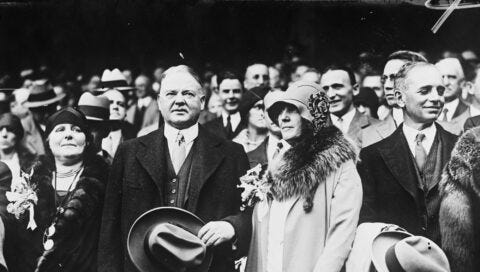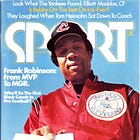This is Throwbacks, a newsletter by me, Michael Weinreb, about sports, history, culture and politics, and everything in-between.
If you like what you read, please click the button below, join the mailing list for FREE and please share, on social media or through e-mail or however you feel comfortable sharing.
And if you’ve been reading for a while, please consider a paid subscription to unlock certain posts and help keep this thing going—you’ll also get full access to the historical archive of over 200 articles. (Click here and you’ll get 20 percent off either a monthly or annual subscription for the first year.
(If your subscription is up for renewal, just shoot me an email and I’ll figure out a way to get you that discount, as well. If you cannot afford a subscription and would like one, send me an email and I’ll comp you one, no questions asked.)
I.
The night before Game 3 of the 1930 World Series, two hundred people lined up outside of Sportsman’s Park in St. Louis. They set up folding chairs and cots and wooden boxes on which to play cards, and they waited patiently for the opportunity to buy one-dollar bleacher tickets. They sang songs until the neighbors shouted at them to keep it down; they were mostly in good spirits, even as they recognized the precariousness of the current moment, both in St. Louis and in America as a whole. “The effects of general unemployment were obvious in many occurrences,” wrote a correspondent from the St. Louis Post-Dispatch.
Many of the people in line had no money to buy food or drinks from the sandwich vendors set up along the sidewalk; others derisively told the police officers presiding over this scenario that they were “living on prosperity,” a phrase, the Post-Dispatch reported, that became kind of a mantra for the crowd by morning.
One of the people in line was a factory worker named Paul Blay, and like many of the others, he had no intention of actually buying tickets for the game. He was merely waiting it out till morning in the hope that he could sell his place in line for twice or three times the price of a bleacher seat. Blay was only working one day a week at the moment, and he saw this as a way to pocket an extra buck or two.
At that moment, baseball was still a wildly popular sport that had shown few signs of contraction. The effects of the stock-market crash had begun to ravage cities like St. Louis, and they would soon get worse; even so, there was a sense, at that moment, that perhaps baseball was immune from the effects. As one magazine wrote, baseball appeared increasingly like “an impregnable industry…strongly entrenched and vitally necessary to public welfare.”
II.
A year later, in September of 1931, The New York Times ran a short item headlined, “Hard-Up Missouri Folk Name Shack Colony Hooverville,” about a group of people who had banded together to build a shantyown of shacks on the banks of the Mississippi River. It was one of the first mentions of the word “Hooverville” in the Times, and it was a sign of just how bad things had gotten. By 1933, unemployment in St. Louis would reach 30 percent; between 3,000 and 5,000 people would wind up living in what became the nation’s largest Hooverville.
Just days after that Times story ran, the World Series returned to St. Louis. And the nation had reached a breaking point. When Herbert Hoover, an avid baseball fan, showed up for Game 3 of the series between the Cardinals and Athletics in Philadelphia, a slow rumble of chants broke out. In the 12th year of prohibition, people with little to look forward to were shouting, “We want beer! We want beer!” And then, for what may have been the first time in American history, the crowd rose and began to boo, in public, the president of the United States.
A number of newspapers, perhaps either confused or cowed by the moment, did not report on the booing. Others ran stories debating whether it had even happened at all. But in the precarity of this moment, with the knowledge that things were likely to get worse before they got better, the frustration was perfectly understandable, even it violated some unspoken sense of decorum.
“This must be the first time a President ever has been booed in public, and at a ball game of all places,” wrote Joe Williams of the New York World-Telegram. “There is something about a ball game that is supposed to make everybody kin and it’s a high honor to sit in on a ball game where the President becomes a fan, just as you and I.”
III.
The return of baseball season a couple of weeks ago felt like a mild reassurance that, despite everything, America was somehow still itself. Baseball has been around for so long, and it has transcended so many dark moments in the American experience, that it can be easy to assume that it actually is an impregnable industry. But this is not and has not ever been true. Baseball is a mere reflection of where we are, and at the moment when it increasingly feels like some kind of terrible blowback might be coming for our country at any moment, the sport also seems to be increasingly in denial about its place in America. The franchise that ushered Jackie Robinson into the sport made a cringe-worthy visit to the White House this week; the commissioner of the sport has largely cowered in the face of a backlash against diversity.
You can make the argument, as Joe Williams did, that baseball should somehow stand above politics, just as you can make an argument that the Dodgers’ visit to the White House should transcend politics.1 But you can also make the case that baseball, given its deeply American roots, can show the first cracks in the facade when the country is headed into a downward spiral. As the 1930s went on, baseball struggled more and more in the face of Hoover’s leadership, forcing it to innovate and reorganize in order to find new revenue streams. “The times were tough for just about everybody, including the young men who tried to make their way as professional baseball players in a decade of persistently discouraging prospects in most kinds of employment,” author Charles C. Alexander wrote in Breaking the Slump, his book about baseball during the Depression era.
By morning in St. Louis on that day in 1930, the price for holding a place in line for bleacher seats for Game 3 of the World Series kept dropping. The dawn had come, but the times were getting darker. Eventually, Paul Blay gave up on making a buck. He stepped out of line without anything to show for it.
This newsletter is very much a work in progress. Thoughts? Ideas for future editions? Contact me via twitter or at michaeliweinreb at gmail, or leave a comment below. If you enjoyed this newsletter, please subscribe and/or share it with others.






By the time the Los Angeles Olympics came around in 1932 Hoover didn’t even bother to open the games, sending his VP instead. After reading your piece I’m now wondering if he just didn’t want to get booed again.
Excellent article. I would be among those booing this president. Arnold Tilden